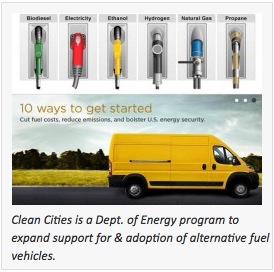 In late November the Department of Energy awarded $11 million to twenty projects to speed adoption of alternative fuel vehicles.
In late November the Department of Energy awarded $11 million to twenty projects to speed adoption of alternative fuel vehicles.
It’s part of DOE’s Clean Cities initiative, which is designed to support community-led efforts to develop the infrastructure for alternative fuel vehicles and reduce dependence on oil.
“These projects address a range of community infrastructure and training needs, such as providing safety and technical training for fleet operators, mechanics, first responders and code officials; streamlining permitting and procurement processes; and helping public and private fleets integrate petroleum reduction strategies into their operations,” according to the DOE news release.
Here two examples of the twenty projects:
Columbus Ohio was awarded $499,918 for the Fast Track to Ohio AFV Adoption project. It “will streamline local and state processes for alternative fuel vehicle (AFV) procurement; incorporate AFVs into local Transportation Improvement Programs (TIPs); create a compressed natural gas (CNG) cylinder tracking system and Renewable Natural Gas Credit Purchase system; deliver technical and safety workshops on various fuels; and expand the Ohio Green Fleets program and the Ohio Natural Gas Vehicle and Propane Partnerships.”
Raleigh, North Carolina received $500,000 for the Alternative Fuel Implementation Team (AFIT) for North Carolina project. It “will develop petroleum reduction toolkits for fleets; collaborate with neighboring states on uniform road signage to indicate alternative fuel availability; and disseminate best practices among potential fleets and alternative fuel vehicle users by hosting a Southeastern alternative fuels symposium.”
More from the Clean Cities website:
Clean Cities helps vehicle fleets and consumers reduce their petroleum use. Clean Cities builds partnerships with local and statewide organizations in the public and private sectors to adopt:
- Alternative and renewable fuels
- Idle-reduction measures
- Fuel economy improvements
- New transportation technologies, as they emerge.
Clean Cities works to reduce U.S. reliance on petroleum in transportation by:
- Establishing local coalitions of public- and private-sector stakeholders committed to reducing petroleum use
- Identifying funding and financial opportunities to support Clean Cities projects
- Developing information resources that educate transportation decision makers about the benefits of using alternative fuels, advanced vehicles, and other measures that reduce petroleum consumption
- Reaching out to large fleets that operate in multiple states to help them reduce petroleum use
- Providing technical assistance to fleets deploying alternative fuels, advanced vehicles, and idle reduction
- Analyzing data from industry partners and fleets to develop tools and information for the Alternative Fuels Data Center that help stakeholders reduce petroleum consumption
- Working with industry partners and fleets to identify and address technology barriers to reducing petroleum use.
…
Larry Ehl is the founder and publisher of Transportation Issues Daily. In the public sector, Larry was Federal Relations Manager for Washington State DOT; Chief of Staff to US Senator Slade Gorton; and was twice elected to the Edmonds School Board.
Tags: Alternative Fuel Vehicles, Clean Cities, Columbus, Larry Ehl, NC, North Carolina, OH, Ohio, Raleigh, Transportation Issues Daily






 RSS Feed
RSS Feed